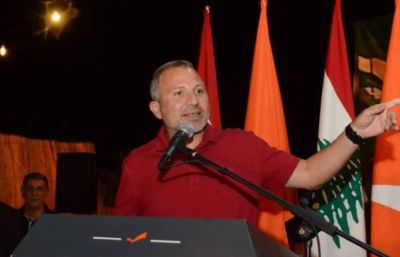
Hezbollah and FPM supporters gather in front of Baabda Palace to celebrate the end of Michel Aoun's mandate, October 31, 2022. (Credit: João Sousa/L'Orient Today)
Presidential bartering is shaping Lebanon’s politics. The newest proposal? Extensive decentralization and a trust fund in exchange for the Free Patriotic Movement’s support of Hezbollah’s presidential campaign. Even the candidacy of Marada leader Sleiman Frangieh — Hezbollah and Amal's preferred candidate — is no longer being rejected as strongly as it was mere months ago.
Proposed by Bassil to Hezbollah after months of quarrel, this newly proposed trade-off has reinvigorated presidential election debates. However, it remains controversial. First, because the FPM has long opposed Frangieh, and second, because Christian public opinion has entered a state of self-focused withdrawal, particularly after the sectarian clashes in Kahaleh earlier this month.
Within such a context, dialogue between the FPM and Hezbollah might not seem like a good idea to FPM supporters.
‘That’s what politics is all about’
The rivalry between the FPM and Marada goes back many years. Even when the two parties were united under the Change and Reform bloc after the 2009 elections, their relations had its highs and lows— all the more as each of the parties claimed to be closer to Hezbollah.
When Hezbollah chose to lead Michel Aoun’s battle for presidency in 2014, Frangieh felt like he had been thrown under the bus. And let’s not forget the Frangieh family’s close ties to Parliament Speaker Nabih Berri, of whom the FPM is not fond.
The FPM went so far as to accuse Frangieh of corruption, notably in the Sonatrach case in 2019, when Frangieh’s relatives were suspected of supplying Électricité du Liban (EDL) with tainted fuel.
From the beginning of the battle for Aoun’s succession, the FPM made clear their belief that Frangieh does not have “the means to turn the country around.”
Yet today, the FPM says it is ready to make “the ultimate sacrifice.”
“This proposal has given back hope to the Lebanese,” said Rindala Jabbour, an FPM official. “At a time when the presidential vacuum is likely to last, our party has succeeded in raising the real issue, that of public policy and the program, rather than the name,” she continued. “The two projects we are putting on the table will serve the interests of all Lebanese. At the end of the day, that’s what politics is all about.”
Not everyone is on the same page, however. “In theory, the FPM leadership is right: in a democratic country, it is common for parties to demand the enactment of laws or projects in exchange for their support for a candidate,” said a former FPM member who was expelled from the party by Bassil and requested anonymity. “However, when you have spent years demonizing a political figure, accusing him of all the evils, you can’t forget all that in the blink of an eye,” he said.
Some FPM supporters stand convinced. “We are very fond of decentralization,” said Zoe*, a FPM supporter based in Kesrouan. “Yes, Sleiman Frangieh is far from being the ideal figure for the job. But if we manage to implement the reforms we want, he won’t be able to harm the country even if he becomes president of the republic,” she said.
Extensive administrative and financial decentralization and a trust fund for the management of state assets would considerably reduce the role of the central state in district affairs, and yield power to regions and the private sector.
Cynthia*, a staunch FPM supporter living in Baabda, agrees. “Gebran Bassil doesn’t do a U-turn,” she said. “He’s simply not rigid, as are the opposition MPs, for example. He works hard and compromises for the good of the country, like a true leader.”
Kahaleh?
But what about the incidents in Kahaleh? On Aug. 8, a gunfight between Hezbollah members and residents of the Christian village left two people dead after a truck carrying Hezbollah weapons overturned. The incident claimed the lives of Ahmad Kassas, a Hezbollah militant, and Fadi Bejjani, a Kahaleh resident reputedly close to the FPM.
Following the shoot-out, Cesar Abi Khalil, FPM MP for the district, lashed out at Hezbollah. “A resident of Kahaleh was killed five meters away from his house and any dialogue must start by handing over the perpetrators of this crime to the justice system,” he said.
But once the fever calmed down, dialogue between the two allied parties resumed. “There is no alternative,” said Jabbour.
This 'business as usual' attitude reflected on some FPM supporters. “Gebran Bassil is letting justice take its course,” said Zoe. “The Shiites have always been armed to the teeth and they clearly dominate the game. Soon, they might even make us pay a jizya [tax imposed on non-Muslims],” she continued.
“However, it’s not the fault of the FPM which is the only one that wants to do something about it. It is proposing decentralization to preserve living together, and is advocating dialogue to integrate Hezbollah into the state [institutions]. In the meantime, what are the others doing?”
FPM supporters opposing Bassil believe the party leader has no other choice. “After Kahaleh, Gebran had to slow down a little so as to avoid offending his popular base, but in reality, he cannot allow interrupting the dialogue with Hezbollah, his only bulwark against Joseph Aoun,” said the former FPM member.
Many observers believe the FPM leader reconciled with Hezbollah only after feeling threatened by the candidacy of Army Commander Joseph Aoun, who was being considered with favor by the international community. While the FPM has a historically close role with the army and military folk make up a large part of its electorate, Bassil is on a crusade against the head of the institution, who he has accused of corruption.
And that is the real risk Bassil is taking. “Frankly, that’s the only criticism I have at Gebran Bassil. If we can have a decentralization, along with the commander-in-chief of the army [as president], it would be much better than having Sleiman Frangieh,” said Cynthia. “We like Joseph Aoun.”
*First names have been changed
This article was originally published in French in L'Orient-Le Jour. Translation by Joelle El Khoury.

